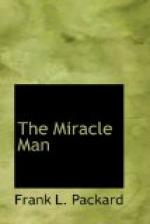And as he walked in the freshness of the night, the restless turmoil of his soul that since early afternoon had brought him near to the verge of madness itself, that had robbed him of sane virility, that a moment since in his room had suddenly begun to lift from him even as the leaden clouds in the vault above him now were scattering, breaking, and through the rifts a moon-glint and the starlight came, passed from him utterly—and a strange calm, a strange joy, a strange sadness was upon him—and his brain for the first time in many hours was rational, keen—and he was master of himself again—and yet master of himself no more!
He smiled a little at the seeming paradox—smiled a little wistfully. He was beaten—by the game—he had won. How strange it was that sense of more than resignation now—a sense that seemed like one of thankfulness—a sense that bade him fling wide his arms as though suddenly they had been loosed from bondage and he was free, free as the God-given air around him.
He could understand Helena, and the Flopper, and Pale Face Harry now. With them it had come slowly, in a gradual concatenation, a progression, as it were, that had worked upon them, molding them, changing them day by day—and he had been too blind to see, or, seeing, had measured the changes only by a standard as false as all his life had been false. With him it had come in a crash, unheralded, that had left him a naked, quivering, stricken thing to know madness, terror and despair, to taste of emotions that had sickened the soul itself.
On Madison walked—along the road, across the little bridge, into the wagon track where, under the arched branches, it was utter dark. There was no one upon the road—he passed no one—saw no one—he was alone.
He had lost Helena—but he understood her now—understood the depth of remorse that she was living through, the terror and the dread as she sought escape, the fear of him—yes, it would be fear now where once it had been love! He had lost Helena—that was the price he had paid—but he understood her now, and he was going to her to help her if he could, going to tell her that he, too, was changed—as she was changed.
His hands clenched suddenly. God, the misery, the hopelessness, the wreck and ruin that lay at his door! And amends—what amends could he make—it was too late for that! How clearly he saw now—when it was too late! Her life was a broken thing, robbed, stripped and despoiled for all the years to come. Their love had not been love—she had given it its name—“passion, vice, lust, sin, degradation and misery and shame.” And then love had come to her, into her life, love as God had meant love to be, and she had learned what love was she had said—only that she might never know its fulness, only that it might bring her added bitterness and added sorrow! Thornton had asked her to marry him that night—and she had refused him—because the past, it must have been as a shuddering, hideous phantom that the past had risen before her, had left her no other thing to do but turn away. It seemed he could see her—see her bury her face in her hands and—




